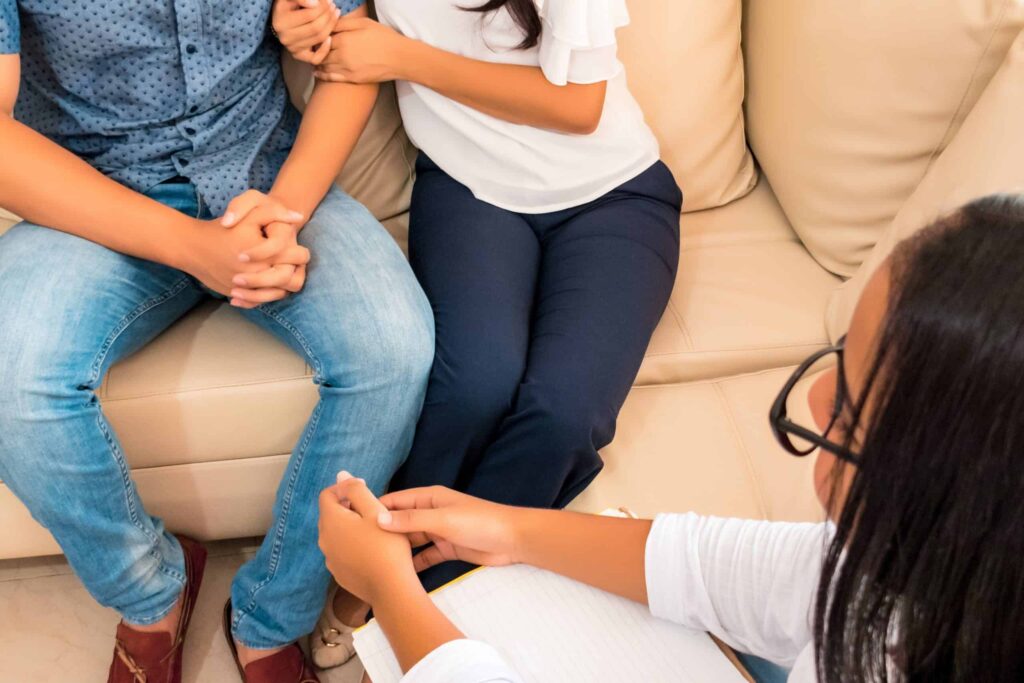Bilingual couples face unique challenges in their relationships, stemming from the intersection of language and culture. These challenges can strain communication and understanding between partners. However, there is a solution that caters specifically to the needs of bilingual couples: bilingual couples therapy. In this article, we will explore the benefits of bilingual therapy, techniques employed by therapists, and how it can help couples overcome communication barriers and cultural differences.
Contents
Understanding the Challenges of Bilingual Couples

Bilingual couples face unique challenges that can impact their relationship dynamics. These challenges arise from differences in language, communication styles, cultural backgrounds, and expectations. Here are some common challenges faced by bilingual couples:
- Language Barriers: Language differences can create barriers to effective communication. Partners may struggle to express themselves fully, find the right words to convey their thoughts and emotions, or accurately understand each other’s messages. This can lead to misunderstandings, frustration, and a sense of being misunderstood.
- Cultural Differences: Bilingual couples often come from different cultural backgrounds, which can result in different values, beliefs, and expectations. These cultural differences can influence communication styles, gender roles, family dynamics, and approaches to conflict resolution.
- Power Imbalance: In some cases, one partner may be more proficient in the shared language, resulting in an imbalance in power dynamics. The less fluent partner may feel at a disadvantage, struggle to assert themselves, or feel marginalized in discussions.
- Misinterpretation and Miscommunication: Due to language and cultural differences, partners may misinterpret each other’s intentions, tone, or non-verbal cues. Cultural nuances and different communication styles can lead to misunderstandings, as certain gestures or expressions may carry different meanings in different cultures.
- Identity and Acculturation: Bilingual couples may face challenges related to individual identity and acculturation. Each partner may navigate the balance between their cultural heritage and the new culture they are immersed in.
- Family and Social Expectations: Bilingual couples often deal with the expectations and opinions of their respective families and social networks. These expectations can include cultural traditions, values, or even pressures to maintain or prioritize a specific language or cultural identity.
- Parenting and Language Choices: Bilingual couples who have children face decisions regarding language choices for their children’s upbringing. Deciding which language(s) to speak at home, how to teach multiple languages, and addressing potential language dominance issues can be complex and require open communication and agreement between partners.
The Role of Bilingual Couples Therapy
Bilingual couples therapy plays a crucial role in helping couples navigate the unique challenges that arise from language and cultural differences. Here are some key roles and benefits of bilingual couples therapy:
- Communication Facilitation: Bilingual couples therapy helps facilitate effective communication between partners who prefer to communicate in different languages. The therapist serves as a bridge, ensuring that messages are accurately translated and understood. By providing interpretation and translation services, the therapist helps overcome language barriers, reducing misunderstandings and enhancing communication.
- Cultural Understanding and Sensitivity: Bilingual couples therapy promotes cultural understanding and sensitivity. The therapist helps partners explore and appreciate each other’s cultural backgrounds, beliefs, values, and expectations. Through open dialogue and education, couples can gain insight into how culture influences their relationship dynamics. This understanding fosters empathy, reduces assumptions, and enhances cultural sensitivity within the relationship.
- Conflict Resolution and Negotiation: Bilingual couples therapy equips couples with tools and strategies for resolving conflicts that may arise from cultural differences and language barriers. The therapist helps couples develop effective communication skills, active listening techniques, and conflict resolution strategies that are tailored to their unique cultural and linguistic context. This enables couples to navigate differences and find mutually satisfactory resolutions.
Techniques and Strategies in Bilingual Couples Therapy

Bilingual couples therapy involves the use of various techniques and strategies to address the unique dynamics and challenges that arise when partners prefer to communicate in different languages or come from different cultural backgrounds. Here are some common techniques and strategies used in bilingual couples therapy:
- Interpretation and Translation: The therapist serves as an interpreter or translator when necessary, ensuring that both partners fully understand each other’s messages. They help bridge the language gap by providing accurate translations and interpretations, minimizing misunderstandings, and promoting effective communication.
- Code-Switching: Code-switching involves shifting between different languages or dialects within a conversation. In bilingual couples therapy, code-switching can be used to facilitate communication by allowing partners to express themselves in the language they feel most comfortable with. The therapist can guide and facilitate code-switching during sessions to ensure that both partners can fully express their thoughts and emotions.
- Cultural Exploration and Education: Bilingual couples therapy often involves exploring and educating partners about each other’s cultural backgrounds. The therapist may encourage discussions about cultural values, traditions, beliefs, and expectations. This process promotes understanding, empathy, and appreciation for each other’s cultural differences, ultimately fostering a more harmonious relationship.
- Mindful Listening and Reflection: The therapist encourages mindful listening, where partners actively listen to each other without judgment or interruption. They reflect what they hear to ensure accurate understanding and validate each partner’s experience. This technique promotes empathy, validation, and a deeper connection between partners.
- Role-Play and Modeling: The therapist may use role-play and modeling techniques to demonstrate effective communication strategies and problem-solving skills. Partners can observe the therapist engaging in healthy communication and then practice those skills themselves. This helps partners develop new ways of interacting and resolving conflicts within their relationship.
Benefits of Bilingual Couples Therapy
Bilingual couples therapy offers several benefits for couples who prefer to communicate in different languages or feel more comfortable expressing themselves in their native languages. Here are some of the advantages of bilingual couples therapy:
- Enhanced communication: When couples can communicate in their preferred language, it can improve the quality and depth of their communication. They can express themselves more authentically, clarify their feelings and thoughts more effectively, and ensure that their messages are accurately conveyed and understood by their partner. This can lead to better understanding and resolution of conflicts.
- Cultural sensitivity: Bilingual couples therapists who are familiar with the cultural backgrounds and nuances of both partners can bring a heightened level of cultural sensitivity to the therapy process. They can understand and navigate the unique challenges, expectations, and dynamics that may arise due to cultural differences. This can promote a more inclusive and respectful therapeutic environment.
- Emotional comfort: Language is closely tied to emotions and personal expression. In bilingual couples therapy, each partner can express their emotions and experiences in their native language, which may feel more natural and comfortable for them. This can create a sense of safety and trust, allowing for a deeper exploration of emotions and issues within the relationship.
- Improved understanding: Bilingual therapists can facilitate a better understanding of each partner’s perspective, especially when language and cultural barriers exist. They can bridge the gap between languages, help clarify any misunderstandings, and ensure that both partners’ viewpoints are acknowledged and respected. This can foster empathy and compassion between partners.
- Access to cultural resources: Bilingual therapists can provide access to cultural resources, such as books, articles, or therapeutic techniques specific to each partner’s culture. These resources can enrich the therapy process and provide couples with additional tools for navigating cultural differences and challenges within their relationship.
Finding a Bilingual Couples Therapist
Finding a bilingual couples therapist can be important if you and your partner prefer to communicate in different languages or feel more comfortable expressing yourselves in your native languages. Here are a few steps to help you find a bilingual couples therapist:
- Search online directories: Start by searching online directories or databases of therapists. These websites allow you to filter your search by language spoken. Enter your location and specify the languages you and your partner speak to find therapists who can accommodate your needs.
- Seek recommendations: Ask friends, family members, or colleagues if they know of any bilingual couples therapists in your area. Personal recommendations can be valuable because they often come with insights into the therapist’s approach and style.
- Consult professional associations: Contact professional associations or organizations. These focus on couples therapy or mental health in your country or region. They may provide resources or referrals to bilingual therapists who specialize in working with couples.
- Contact local universities: Reach out to local universities that offer psychology or counseling programs. They may have counseling centers or clinics where graduate students provide therapy services under the supervision of licensed professionals. Inquire if any bilingual therapists are available.
- Consult multicultural organizations: Reach out to multicultural organizations, community centers, or immigrant support groups in your area. These organizations often have connections to bilingual therapists or can provide recommendations based on their networks.
Conclusion
Bilingual couples therapy provides a valuable resource for couples seeking to navigate the challenges that arise from language and cultural differences. By addressing communication barriers and cultural dynamics, therapists facilitate understanding, promote empathy, and strengthen relationships. Bilingual couples can benefit greatly from seeking the support of a qualified therapist who can guide them toward a more fulfilling and harmonious partnership.
Addressing and resolving a couple of issues is essential for a strong and lasting partnership. If you have any queries regarding Online Couple Counseling experienced therapists at CoupleMantra can help. Book a trial couple therapy session.


